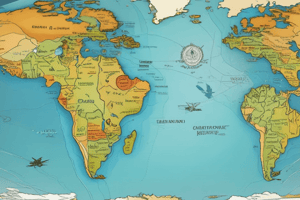Podcast
Questions and Answers
What primary role do rules of origin play in international trade and customs?
What primary role do rules of origin play in international trade and customs?
- They determine the country of origin for goods, services, or investments. (correct)
- They standardize international trade laws across different countries.
- They regulate the transportation of goods between countries.
- They determine the applicable tariff rates for imported goods.
Why are rules of origin considered important in international trade?
Why are rules of origin considered important in international trade?
- They ensure uniform environmental standards for imported goods.
- They have a significant impact on the cost and competitiveness of a product. (correct)
- They promote fair labor practices in exporting countries.
- They simplify customs procedures and reduce administrative burdens.
According to the information, what is one of the key considerations that rules of origin influence?
According to the information, what is one of the key considerations that rules of origin influence?
- Domestic tax policies
- Environmental protection agreements
- International currency exchange rates
- Foreign investment decisions (correct)
How can a country utilize rules of origin to manage its trade policies?
How can a country utilize rules of origin to manage its trade policies?
Within the CSME framework, what does Article 84(1) primarily define?
Within the CSME framework, what does Article 84(1) primarily define?
Under the direct consignment rule, what condition must products meet to be considered as directly consigned?
Under the direct consignment rule, what condition must products meet to be considered as directly consigned?
What specific condition allows products to transit through non-contracting states without losing their direct consignment status?
What specific condition allows products to transit through non-contracting states without losing their direct consignment status?
What activities are permissible in a non-contracting state without affecting the direct consignment status of goods?
What activities are permissible in a non-contracting state without affecting the direct consignment status of goods?
What is the underlying assumption regarding products during transit that maintains their eligibility for specific rules of origin benefits?
What is the underlying assumption regarding products during transit that maintains their eligibility for specific rules of origin benefits?
What does Rule 1 specify regarding the resources used in the production of goods within a community?
What does Rule 1 specify regarding the resources used in the production of goods within a community?
Which of the following best describes 'goods wholly produced' according to the rules of origin?
Which of the following best describes 'goods wholly produced' according to the rules of origin?
What is considered a 'substantial transformation' of goods in the context of rules of origin?
What is considered a 'substantial transformation' of goods in the context of rules of origin?
How can 'substantial transformation' be satisfied if goods are produced from materials of undetermined origin?
How can 'substantial transformation' be satisfied if goods are produced from materials of undetermined origin?
What does the concept of 'unit of qualification' refer to in the context of rules of origin?
What does the concept of 'unit of qualification' refer to in the context of rules of origin?
What does the 'segregation of materials' rule allow for in accounting for the origin of goods?
What does the 'segregation of materials' rule allow for in accounting for the origin of goods?
Under what condition does the treatment of repaired goods not affect their origin status?
Under what condition does the treatment of repaired goods not affect their origin status?
How are packing materials treated when assessing customs duties, according to the rules?
How are packing materials treated when assessing customs duties, according to the rules?
What is generally required as documentary evidence of origin and consignment?
What is generally required as documentary evidence of origin and consignment?
What action can an importing member state take if they require further evidence of origin?
What action can an importing member state take if they require further evidence of origin?
Under Rule 10, what action can a competent authority in a member state initiate regarding imports?
Under Rule 10, what action can a competent authority in a member state initiate regarding imports?
What obligation do member states have regarding untrue declarations seeking community tariff treatment?
What obligation do member states have regarding untrue declarations seeking community tariff treatment?
According to the rules of origin, what is the role of Mr. Sean Richmond?
According to the rules of origin, what is the role of Mr. Sean Richmond?
What aspect of a product's origin do the rules of origin primarily determine?
What aspect of a product's origin do the rules of origin primarily determine?
If a product undergoes transit through a non-contracting state, what conditions must be met to maintain its original consignment status?
If a product undergoes transit through a non-contracting state, what conditions must be met to maintain its original consignment status?
How do rules of origin relate to a country's ability to administer trade measures?
How do rules of origin relate to a country's ability to administer trade measures?
Flashcards
Rules of Origin
Rules of Origin
Laws, regulations, and administrative rulings used by governments to determine the country of origin of goods, services, or investments.
CSME Article 84(1)
CSME Article 84(1)
The legal framework for CARICOM's Rules of Origin Regime is set out in this article of the CSME.
Direct Consignment Rule
Direct Consignment Rule
This rule states that goods must be transported directly from the exporting state to the importing state to maintain origin status.
Direct Consignment Condition
Direct Consignment Condition
Signup and view all the flashcards
Rules Regarding Community Origin - Rule 1
Rules Regarding Community Origin - Rule 1
Signup and view all the flashcards
Rules Regarding Community Origin - Rule 2
Rules Regarding Community Origin - Rule 2
Signup and view all the flashcards
Rules Regarding Community Origin - Rule 3
Rules Regarding Community Origin - Rule 3
Signup and view all the flashcards
Rules Regarding Community Origin - Rule 3 (Cont'd)
Rules Regarding Community Origin - Rule 3 (Cont'd)
Signup and view all the flashcards
Rules Regarding Community Origin - Rule 4
Rules Regarding Community Origin - Rule 4
Signup and view all the flashcards
Rules Regarding Community Origin - Rule 5
Rules Regarding Community Origin - Rule 5
Signup and view all the flashcards
Rules Regarding Community Origin - Rule 6
Rules Regarding Community Origin - Rule 6
Signup and view all the flashcards
Rules Regarding Community Origin - Rule 7
Rules Regarding Community Origin - Rule 7
Signup and view all the flashcards
Rules Regarding Community Origin - Rule 8
Rules Regarding Community Origin - Rule 8
Signup and view all the flashcards
Rules Regarding Community Origin - Rule 9
Rules Regarding Community Origin - Rule 9
Signup and view all the flashcards
Rules Regarding Community Origin - Rule 10
Rules Regarding Community Origin - Rule 10
Signup and view all the flashcards
Rules Regarding Community Origin - Rule 11
Rules Regarding Community Origin - Rule 11
Signup and view all the flashcards
Study Notes
- Sean Richmond, Deputy Commissioner of Custom, Excise and Trade Administration, is the presenter for this information.
- Rules of Origin are laws, regulations, and administrative rulings applied by governments.
- They are used to determine the country of origin for goods, services, or investment.
- Rules of Origin are important because they significantly affect the cost and competitiveness of a product.
- They are also a key consideration in foreign investment decisions.
- Countries use them to administer tariff preferences, quotas, safeguard measures, and anti-dumping measures.
- Article 84(1) in the CSME sets the legal framework for CARICOM's Rules of Origin regime.
Direct Consignment Rule
- Products must be transported directly from the exporting contracting state to the importing contracting state to be considered directly consigned.
- This means they should not pass through the territory of any non-contracting state.
- Products can transit through one or more intermediate non-contracting states with or without trans-shipment or temporary storage if:
- Transit entry is justified for geographical reasons or transport requirements.
- The products have not entered into trade or consumption there and have not undergone any operation other than unloading, reloading, or operations required to keep them in good condition.
- The assumption is that the products have not undergone change or transformation during transit.
Rules Regarding Community Origin
- Rule 1 involves the usage of vessels, materials, energy, fuel, plant, machinery, and tools.
- Their utilization in the production of goods within the community is subject to specific conditions to meet origin requirements.
- Rule 2 says that Goods wholly produced include mineral and vegetable products.
- They also include live animals, products obtained by hunting or fishing, and marine products extracted from the ground or by fishing conducted within the Community.
- Rule 3 covers substantial transformation.
- This transformation relates to goods produced within the community.
- This can be either wholly or partially from materials imported from any port outside the community.
- Additionally, substantial transformation can be achieved:
- Goods made from materials that have no determination of origin.
- The process affects a substantial change by a change in tariff heading or satisfying the conditions outlined in 'THE LIST' in Schedule I.
- Rule 4 states that the unit of qualification relates to a consignment.
- Articles may be considered separately.
- Goods being imported unassembled or disassembled can be treated as one article if the importer requests.
- Rule 5 says that segregation of materials allows for an acceptable accounting system.
- This system records the different origin used in the production of goods by permitting an importer to account for segregated goods.
- Rule 6 clarifies that the treatment of repaired goods should not affect the origin status if such process within the community does not result in a change of the form or character of the goods.
- Rule 7 says that Member States may treat goods separately from their packing when looking at customs duties.
- Rule 8 covers documentary evidence.
- Evidence of origin and consignment must be a certificate of origin.
- The certificate of origin issued by the governmental authority of the exporting member state.
- Rule 9 addresses the verification of evidence of origin.
- The importing member state may require further evidence of origin.
- The importer can still take delivery of goods with a customs security deposit.
- Rule 10 addresses the application of a safeguard mechanism.
- The competent authority in a member state may initiate action to protect a specific industry.
- This safeguard is applied if there is a build-up of imports which cause, or threaten, serious injury.
- Rule 11 covers sanctions for breaking the rules.
- Member States must introduce legislation and impose penalties against persons who facilitate declarations seeking community tariff treatment in their state.
Studying That Suits You
Use AI to generate personalized quizzes and flashcards to suit your learning preferences.




